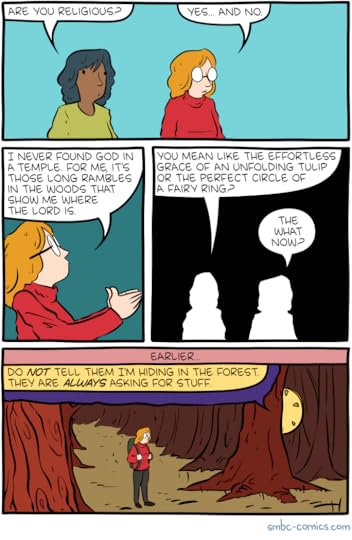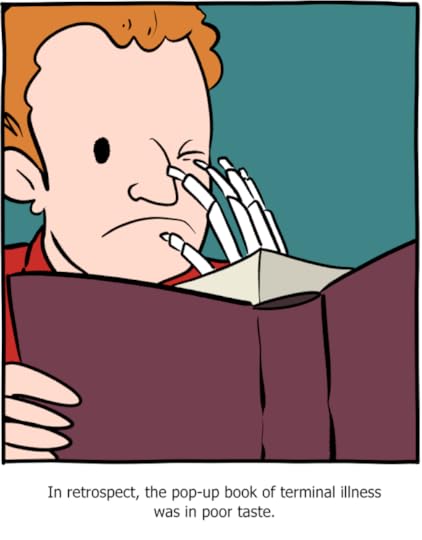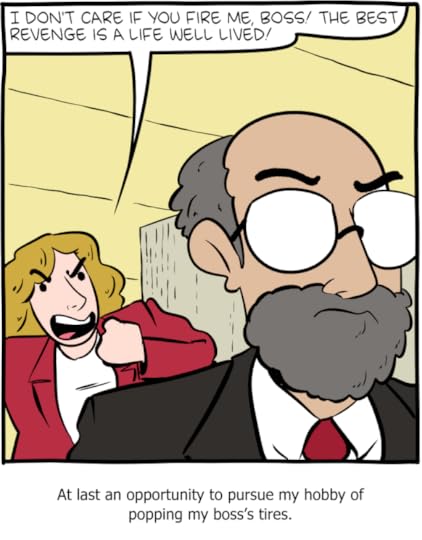Zach Weinersmith's Blog, page 122
June 17, 2022
Saturday Morning Breakfast Cereal - Existntial

Click here to go see the bonus panel!
Hovertext:
On a good day I can complete this loop 43 times.
Today's News:
June 16, 2022
Saturday Morning Breakfast Cereal - Solved

Click here to go see the bonus panel!
Hovertext:
There's another philosophical problem solved. This is easy.
Today's News:
June 15, 2022
Saturday Morning Breakfast Cereal - Beta

Click here to go see the bonus panel!
Hovertext:
Come. Join me in this lovely world where it's all just been a misunderstanding.
Today's News:
I have a theory about writers, which is they reach peak expansiveness around age 50 or so. Not necessarily peak quality or peak beauty - peak likeliness to concern themselves with big questions about things like sex, death, meaning, their place in the universe, and so on.
I got to thinking about this reading Jan Morrisâ recent book of published daily reflections, Thinking Again. She wrote it when she was 91 and 92, and it was published in 2020. It is almost entirely trivial, and hardly even reflective. I would say itâs almost startlingly in the moment for someone who anticipates dying at almost any time. Much of it is about that dayâs weather, favorite trees, how she talks to people in the neighborhood, being Welsh, current politics, and so on. Even the subject of her wifeâs dementia - surely a spur to thoughts on the nature of being - is mentioned with something close to dispassion. Almost like a description of the decor of her life. Contrast with her earlier book Condundrum (1974), which is all reflection and deep thoughts on just about everything. Love, beauty, the nature of attachment, ideas of femininity and masculinity, childrearing, depression - everything. In middle age, she is at her most reflective. In old age, her most frivolous.
I wonder why this is. A literary comparison springs to mind - Nevil Shute. Shute is a beloved author of mine, whose entire corpus Iâve read. I find he tracks me theory of middle age expansiveness pretty well. Born in 1899, his early books are horrible 1920s spy thrillers. I canât remember which, but as I recall if you read his books in order, around the third or fourth book thereâs a moment when the mediocre characters in a mediocre plot find themselves sharing a quiet moment poking at some coals in a small fire. After that the books get better. Itâs as if Shute got the thriller stuff out of his system, and was ready to write life as it was. And I find his two best books, Pied Piper and Requiem for a Wren were both written in his 40s and 50s, as was his more famous book On the Beach. Pied Piper is about an old man finding himself in the position of getting a large number of orphaned children to safety in World War II. Requiem for a Wren is complex, but I think of it as being fundamentally about people who were young and vibrant during that war finding that life afterward is unbearably hard and complicated and lonely and purposeless. And On the Beach is proper brooding melancholy about a post-nuclear war world where everyone is dying. But then we get to his very last book, written just past the age of 60, Trustee from the Toolroom, which is a light mildly comedic mystery story, which literally concerns an old man who likes building tiny things.
It occurred to me as I wrote this that I literally cannot think of an author who became more reflective in old age. Some (CS Lewis is perhaps the ultimate example) write essays that donât seem to change in style or tone, whose period in his life are only detectable from biographical knowledge. Some, like Orwell, never get past middle age, and never got properly trivial. EB white, as I recall is talking about world government and the nature of democracy in middle age, but his later essays are more apt to be about dogs and barns and grandchildren.
Iâm about at the beginning of middle age, I suppose, and I donât know why the above should be true. In fact, I donât quite know why I have the stereotype that the elderly should be especially engaged in the Big Questions. I suspect if you want to meet a literary old man whoâs battling these things, you ought to read an old man character written by a 45 year old. The actual old authors I can think of seem to be more in the moment.
I have a guess about why this should be, but itâs only a guess. Letâs take for granted my theory that peak reflectiveness comes with middle age. An interesting correlation is that the statistical peak of misery is around 40 to 50. It varies by country, but my understanding is that in developed countries this finding is pretty robust: peak happiness is around 20, the bottom is around 40, and then ever after, on average, happiness grows, even into very old age. There are different theories on why this should be, but Iâll give three I like.
One is an argument from evolution. Middle age is a time when in our species you are naturally somewhat on the wane, and so you grow more status conscious. Status consciousness being the royal road to immiseration, you soon find yourself writing existentialist literature.
A second idea is about responsibility. From age 0 to 25, at least for many of us, you keep getting more power in life with little added responsibility. You get to vote, to drink, to drive, to go out all night and not tell anyone. Maybe you make a little money, people start to respect your competence, you feel positively adult. But you donât have kids to look after or a mortgage. Your is at its peak. The things that keep you up at night are interesting or sexy - not scary or bleak. But then things reverse - the privileges stay, but few or new ones are added. And meanwhile more and more people come to depend on you just as you begin to fear more for your own health. In short, you become weighed down with worries, and these are not especially offset by the novelties of aging in the way the movement from 18 to 25 was.
A third idea, which Iâm very sympathetic to because I think it better explains the late-in-life uptick, is that this is all just about expectation. You probably expect 30 or 40 or so to be pretty amazing when younger. And then it turns out its quite hectic, and you really donât have anything figured out. Meanwhile you didnât become a movie star or a famous athlete or a sex god or whatever it was. Those years simply cannot live up to the hope you once held. But the recompense is that you expected old age to be miserable, and in fact it isnât. Youâre Jan Morris strolling the Welsh countryside, enjoying accosting young joggers with jokes, having homemade marmalade from the neighbor, watching young people and vicariously feeling their happiness. Objectively your worries are more legitimate and real than 40 years earlier, but you never expected to even by alive this long in the first place. All expectations have been surpassed.
So maybe that explains it. I think the searching that produces good literature, or at least literature dealing with Big Stuff, is often spurred by sadness, or better still by the need to see things as they are while fitting them into a picture that makes sense. This is a kind of cosmic improv game humans inflict on themselves when things are going poorly - take what has happened so far and justify it.
I live on an old farm. Out my office window a white fence follows a road down the slope of a valley where hay is grown. When I am having a good day, the hills are just hills. On a bad day, I require them to explain the universe. Perhaps the older authors simply feel less need, or perhaps just less inclination to make reality cough up a reason.
June 14, 2022
Saturday Morning Breakfast Cereal - The Lord

Click here to go see the bonus panel!
Hovertext:
Unfortunately, God's habitat keeps shrinking.
Today's News:
June 13, 2022
Saturday Morning Breakfast Cereal - Longevity

Click here to go see the bonus panel!
Hovertext:
Just as the taller leaf is most sun-kissed, so the oldest researcher in the department is cited.
Today's News:
June 12, 2022
Saturday Morning Breakfast Cereal - Priority

Click here to go see the bonus panel!
Hovertext:
You ever encounter an entire field of study that appears to be made of first steps?
Today's News:
June 11, 2022
Saturday Morning Breakfast Cereal - AI

Click here to go see the bonus panel!
Hovertext:
Also is it really fair to tell them to align with us when we don't align with each other?
Today's News:
Well, I got a surprisingly large number of emails about the post on Christopher Milne. I am thinking about exactly what to do here exactly, but I'll probably post more from time to time about books and things.
Also apparently I can put a title on the blogs.
June 10, 2022
Saturday Morning Breakfast Cereal - In retrospect

Click here to go see the bonus panel!
Hovertext:
You can pull a little tab to make the hand point at you.
Today's News:
June 9, 2022
Saturday Morning Breakfast Cereal - Fired

Click here to go see the bonus panel!
Hovertext:
My 8 year old found this on my drawing board and thought it was comedy gold. However, I think she was just laughing at the idea of vandalism, which has me worried.
Today's News:
Oh my goodness, friends. Something very cool happened today with a book project I have kept secret for a long time, but which will be revealed soon.
June 8, 2022
Saturday Morning Breakfast Cereal - Ten Percent

Click here to go see the bonus panel!
Hovertext:
The good news is you can do this to the software engineers and nobody even notices.
Today's News:
I've just finished reading a wonderful book - Christopher Robin Milne's two part biography, the first of which deals with his childhood as the son of the famous author, and the second of which deals with his life as an adult.
Here's an obscure reference: it reminds me deeply of the works of Lilias Rider Haggard, which you haven't read. However, you may know her once-quite-famous author father Henry Rider Haggard, best known for creating the character's Allan Quatermain and "She." In both cases, the parent was the more famous author but lacked a note present in the child. Both Lilias and Christopher do pastoral writing and had lives intersected by the Second World War. Lilias is obscure now, though Christopher Robin may hang on longer thanks to the eternal Disneyfication of stories about Winnie-the-Pooh. This hasn't happened with Henry Rider Haggard because his novels are mostly set in colonial Africa, and though some are less-racist-than-you'd-guess, they are very much books of their period. As I recall, they even have forms of bigotry I hadn't known existed, like deep concerns about English men marrying Dutch women, and the general treacherousness of the Portuguese!
Anyway, I'll tell you what I like about both Lilias and Christopher's work, which is that they're what HR Haggard called "small beer" books, meaning that they're not after big literary achievements. They're just talking about what it was like to be the author at a place and time. This is me slightly stereotyping, but I think the project of a small beer book is helped along by being British. Somewhere Bill Bryson wrote about how the reason he loved living in Britain was how the British could get so delighted by the trivial. It took so little to arouse joy - the weather, a nice hedge, a bowl of custard. In Christopher Milne, he writes about the tedium of managing a bookshop in the village of Dartmouth with the same level of interest and detail that he gives to his war service in Africa and Italy. I don't think this is an act - it's the genuine feelings of a very private very shy man silently and deeply moved by a quiet almost-anonymous life.
You can also see that Milne, had he wanted and had the nerve, could've been an excellent essayist. In a short book he has beautifully phrased thoughts about religion, society, nature, literature, and to my mind he is especially moving when he writes about caring for his daughter Clare who had cerebral palsy. There's a "Prayer for Owen Meanie" quality to it, in that one of Milne's repeated laments is that he had his father's good brain and his mother's ability to make things, but did not excel at either. But then you find him later in life able to use those hands to make a special wheelchair for his daughter and a spoon so she could feed herself. And the part of his mind that is sentimental and fit for writing is able to see the beauty in it.
So go read it - it's called The Enchanted Places. Also, go read anything by Lilias Haggard. None of it is in print any more but none of it costs much, and it is pure liquid charm.
Thanks to everyone who wrote to say they enjoyed the blogs. I had thought social media killed blogging, but a few of you seem to be here in the afterlife. Isn't it strange how a blog without comments is so much more intimate than social media? I think the key is that blogs are like letters, and letters are the most intimate human experience that doesn't involve touching someone's butt. Come to think of it, they may be more intimate now than in their heyday because only a few of you will even bother to read.
Thanks for that.
Zach



